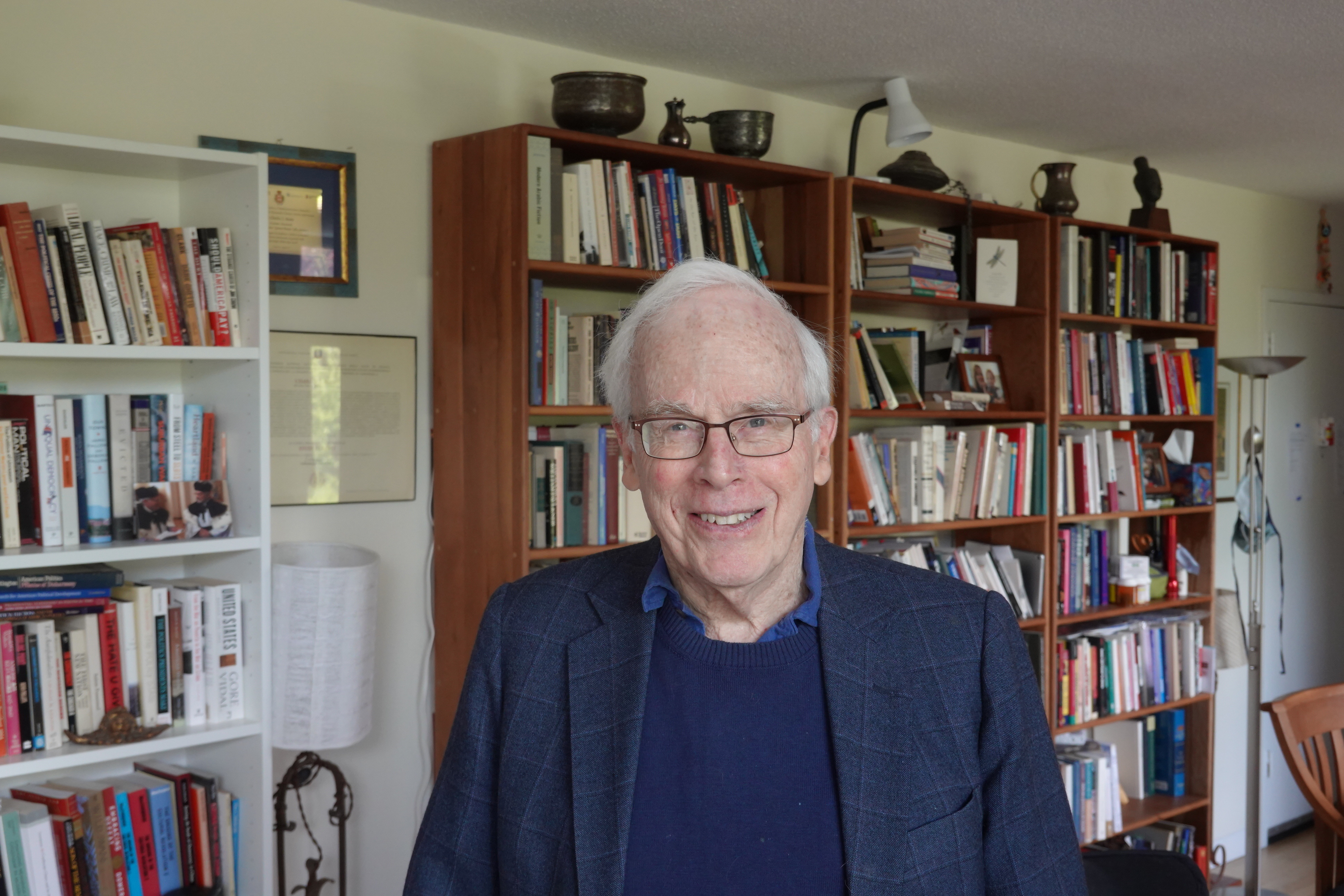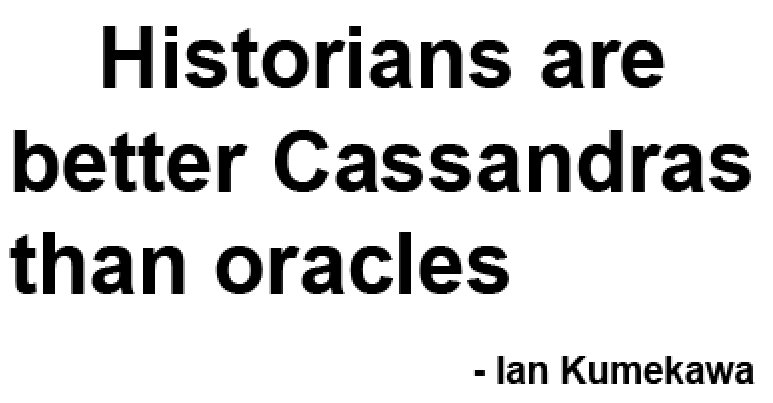The fight against COVID-19 has been equated to a war by some political leaders. While the analogy is appealing, Charles Maier, Leverett Saltonstall Research Professor of History at Harvard University and CES Resident Faculty, and Ian Kumekawa, Ph.D. Candidate in History at Harvard University and a CES Graduate Student Affiliate, weighed in on the argument. in a recent white paper and argue that it is critical to think now about the aftermath. The paper “Responding to COVID-19: Think Through the Analogy of War” was published as part of a series of white papers written for the bipartisan COVID-19 Response Initiative, spearheaded by Danielle Allen, James Bryant Conant University Professor and Director of the Edmond J. Safra Center for Ethics at Harvard University. Maier and Kumekawa discussed their paper with Gila Naderi, CES Communications Manager, by phone.
Naderi: In the white paper you argue that the joint mobilization of government and business in the U.S. and Britain during World War II did not happen overnight and was fraught with resistance, missteps and confusion. How were the governments able to mobilize forces despite all this and how did this effort shape their aspirations for the post-war era? Do you see any parallels to the present?
Kumekawa: Our paper shows that the start to wartime mobilization – principally in the U.S., though a similar story can be told in Britain – was beset with organizational difficulties. It was not clear which authorities had responsibility for what. There were frictions between elements within the state and between the state and private industry. Much of this confusion could have been avoided by clearly delineating who was in charge of what. This is a lesson to be learned from World War II.
An equally pressing purpose of the paper was to show how important it is to begin thinking about what the aftermath of the current crisis should look like. Major crises – whether wars or pandemics – are often powerfully transformative events. It is important to begin thinking as soon as possible about the aftermath, and the steps that the government takes now will have ripple effects and implications for years into the future.
Maier: The analogy of war has been used to describe the fight against the virus. As the paper explains, the analogy remains appealing – Americans deploy it for many of our national challenges; it implies we can act as a united people with purpose and competence. But I believed that while appealing, the analogy of war obscures many important differences. First and foremost, young people fight a human enemy in wars, not an impersonal force. Still, when we set out to write this paper, we thought that since the notion of being at war remains so appealing, let us look at why is it compelling, and how the real record in World War II stacked up against the almost sentimentalized collective memory. And the record is, as Ian said, that we stumbled a lot trying to organize the economy, and our effort was beset by all sorts of organizational difficulties.
I think we can find a parallel today with respect to testing for COVID-19. Why can't our country come up with almost universal testing in the way that South Korea, Taiwan and other places have? We have been rather bumbling in this because it is not clear how to coordinate these responses.
Another purpose of the paper was to point out that many Americans and, even more so, the British were thinking about post-war society. For some the fear of relapsing into depression was troubling. Others who were thinking about the economic and geopolitical challenges before 1941 asked, “how do we want to get beyond the earlier status quo and create a fairer America?” Our paper urges citizens to look at the problems that existed before the Coronavirus and to use this opportunity to think about how to address them.
Naderi: If planning for peace was a goal for the post-war period, then transatlantic relations became one of the big accomplishments of the post-World War II period. In your paper you state that similarly “The post pandemic era provides a moment to renew post-1945 commitments.” What can the history of transatlantic relations or international organizations teach us about the potential to return to international commitments?
Maier: I think we have to disaggregate the question a bit. Although many in the so-called foreign-policy elite envisaged a continuing Anglo-American partnership, creating an ongoing transatlantic commitment was actually more of a Cold War moment. It involved more than the alliance with Britain and required bringing Germans into the transatlantic relationship, especially once the divergence with Russia became ominous. Hardly anyone in 1945 was thinking of creating an architecture that included the enemy we had worked so hard to defeat. At the same time, though, in contrast to the years after World War I, the American electorate was ready to accept participation in a global structure that was an outgrowth of the wartime alliance, which already was named the United Nations. But I don’t think that Americans envisaged “transatlanticism” as such. As a historian, I think it important to understand the distinctions. That said, I strongly believe in the value of transatlantic and other international commitments in general – my lifetime of political awareness spans the era in which the United States did help to construct a fabric of international institutions that we are now seeking to dismantle – and I hope that we can renew the openness to the world that we maintained roughly from the aftermath of World War II until the current administration.
There is big difference now. Americans came to the conclusion during and after the Second World War that our position and leadership was best secured by anchoring it in multi-national institutions. So, we invested in these institutions. But we had a vastly different political class in charge of the country at that point than we do today. Still, I think it is time we renewed our investment in institutions and maybe this crisis will press that point home again. It is hard to stop viruses at the border and say, “We'd like to see your green card.”
Naderi: This crisis has brought up the question of leadership. What implications does the approach to this crisis in the U.S. and European countries have for their respective societies and globally after the crisis?
Maier: I believe that a crisis such as the current one exposes every fault-line in a society that existed beforehand. We can see it in this country where disproportional casualty rates ravage the poor and African-Americans for many reasons: less advantageous living conditions, preexisting income-related health conditions, and employment in the most vulnerable sectors. In the recovery, they will be among those who have to go to work, perhaps in dangerous situations.
Whether the current crisis can help us get beyond the intense political divisions that exist in the U.S., I would not venture to say. The [New York Times] columnist David Brooks is pleased to discover, so he reports, that Americans have learned how much they really share underneath. I am more doubtful. Perhaps because it was a real war with human enemies, the Second World War did help overcome the intense divisions in America during the 1930s and all the way up to Pearl Harbor. And during the war [Franklin D.] Roosevelt brought Republicans into leading positions. It is too early to know if this current crisis has reduced partisanship here.
It may be easier to manage partisanship in a parliamentary regime three centuries old. The British passed judgment on Winston Churchill, who had led them to victory in Europe and removed him from office even before the war ended in Asia because they felt that his party was not committed to a post-war Commonwealth, such as many of them envisaged.
Kumekawa: As a footnote, the slogan for the Labor Party that swept the election in Britain [in 1945] was “Fair Shares for All.” In our paper we urge people to start thinking about the aftermath to our own crisis, specifically what a desirable social landscape post-crisis would look like. The British, at least during World War II, were thinking about not just leadership but also their vision for society. The result was that decisive election in 1945, which ushered in the welfare state.
One of the other things we talked about in the paper is how the Coronavirus has exposed a widespread contempt in the United States for science and scientific expertise. This is clear if you look at the messaging from political leaders in the U.S. versus those in Europe, certainly in liberal democracies in Europe. Leaders there are much more willing to follow the lead of scientific experts. Their constituents expect that and would look askance at leaders who are flagrantly disregarding the advice of scientific experts. I think that's a difference that you see in this country.
Naderi: What will the COVID-19 crisis mean for Europe’s future?
Maier: COVID-19 has posed the question to what extent will European leaders let the European Union be the unit that addresses the future. So far individual countries have followed different health responses. It will be easy for many European nations to look back and say that public health measures, either our own or our European neighbors’, should have been different in the first months. One implicit point in the paper is that there is always going to be a better way to have responded. There was for China. There was for Italy. There was for Britain. The different impact of the disease will of course bring different financial and economic burdens. The issue is to what extent will European leaders of the North – Germany or the Netherlands – be willing to collectivize some of the burdens that arise from the differential rates of the infection. Exposure to the disease should not come with the moral hazard risks and rhetoric that burdened resolution of the Euro crisis.

Meanwhile other difficult issues, which had already become acute, preeminently migration, will return to prominence. Federalism may save us in the U.S., where Washington seems so dysfunctional, but I don’t believe that the analogous appeals to subsidiarity will best serve the EU. A union that cannot pull together in adversity would be a major historical disappointment.
Gila Naderi: You note in your paper that during the war there were hopes in the U.S. that the mobilization efforts would result in improved rights for women and African-Americans, for example, but that this never materialized and, in fact, regressed.
Maier: Perspectives on the future changed rapidly. (Part of that comes from professional habits. Journalists will always say, as they did after 9/11, that nothing will ever be the same. Historians like to say there is nothing new.) After World War II many European observers and intellectuals expected some sort of quasi-socialist transformation of capitalist economies. Within a couple of years, the visionary promise that came with victory seemed to have faded away, and politics reverted to what after the First World War was termed a return to normalcy. At a time, such as the present, it is tempting to belie that nothing can remain the same. But will this prove to be a transformative moment? It seems impossible not to be but in the long run, a lot of transformative moments do not transform. That is a waste in some ways but inevitable in some other ways.
Kumekawa: This is one of the themes of Charlie's work: the importance of stability and the ways in which societies and governments have grappled with and capitalized on a desire for stability. I think it is important not to underrate the value that people put on returning to “normal.”
At the same time, however, it is important to focus on how this will be a tipping point for millions of people in this country who are living in economic precarity or on the verge of economic precarity. We have been addressing this question in terms of big structural changes, whether this is going to be a transformative moment for the structure of the economy or the structure of society. These are open questions. I think that the question of whether it is going to be a transformative moment in the lives of millions of people, at least in the medium term, is not. The economic turmoil and personal loss that has been experienced and will continue to be experienced is incredibly profound.
Naderi: If we fast-forward 20-30 years, what would historians consider the defining moments of this crisis for change?
Maier: A war or a crisis acts like a magnifying glass that focuses sunlight to the point where it can set paper on fire. It accelerates history. In chemical terms, it can be a catalyst. It is less often the originator of postwar developments. What has sobered me in reviewing the history of the 1918-19 influenza epidemic is how few literary traces it left given its horrendous tolls of 40-50 million people. Probably because it was overshadowed by the massive world war just ending, which probably cost “only” half as many lives. But the Great War of 1914-1918, after all, was a real war that claimed all the energies of national mourning. There are no national memorials to the unknown victim of the “Spanish flu.” Perhaps we shall learn how better to commemorate our current victims and heroes.

Kumekawa: I think that historians are better Cassandras than oracles. What we have implied in the paper is that if we do not plan well for the aftermath, we will not have a good aftermath. As historians we are not as well equipped to make more sweeping future predictions. One way of answering your question, however, is to think of texts I would use to teach the present moment. The one that immediately comes to mind is Angela Merkel's “Es ist Ernst” address. It would be instructive, I think, for students to compare that to one of Trump’s press conferences.
This interview has been edited for brevity and clarity. To download the full report please click here.
Photo Credits: Charles Maier and Ian Kumekawa, May 2020.
Title Photo: Assembly line production of fighter aircraft near Niagara Falls, New York; WikiCommons.
